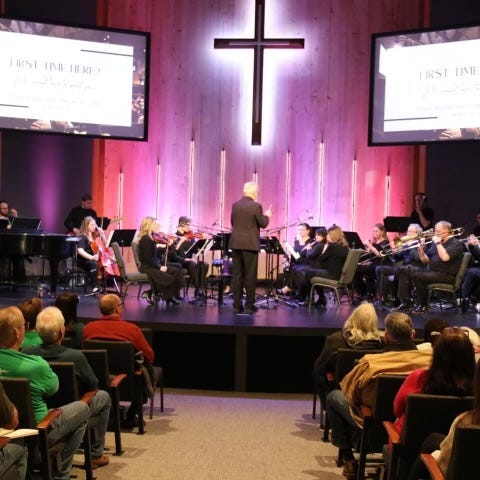Something fascinating I’ve noticed about faith reconstruction is that the process doesn’t stay discretely in the faith sphere; it bleeds into other areas. Recently, I realized that I’ve been reconstructing my philosophy and theology of music, semi-consciously, for quite a while now. It’s paralleled what I’ve done with my faith. Old norms, assumptions, and postures have been gradually transforming to produce a new fruit entirely. I’ll give you an example.
This past weekend I got to play violin at a church with a music pastor that puts together full symphonies for special weekends throughout the year. It was a serious joy; I loved every moment. On the surface, playing violin meant that I didn’t have to sing the words; my heart could respond however I wanted to the melodies and harmonies. This is very good for hiding deconstruction.
Snark aside, I did find myself asking where exactly the joy was coming from. Why was I, who no longer identified as an evangelical, playing music at an evangelical church? Why was it worth the triggers? Where was the drive coming from? The cornerstone of my musical theology growing up was that it was purely for God’s glory, not for the glory of others. He was our motivation, end of story. But, on the stage this weekend, I knew that my motivation was no longer that pure and simple, something else was going on. As I’ve reflected, I realize that I’ve come to believe many more things about music and faith. I’ll try to explain that here.
Growing up, studying violin also meant studying performance. How do you harness your nerves and play in front of a crowd? My family, as Christians, considered our motivation as set apart from the secular world: we played music to bring glory to God and to steward the gifts he’d given to us. There was no reason to be nervous at a recital; it only mattered what God thought.

In the church context, we played for an “audience of One” (to quote a 2005 Big Daddy Weave lyric). I remember being a teen on the church stage, trying to imagine away the congregation, or to somehow imagine Jesus in their place. I remember being proud of myself when I learned to play with my eyes closed, just like the vocalists. Closing eyes meant you were one step closer to reducing your audience to the divine singular. (Raising hands also brought you an additional step closer, but I was always glad that I was holding my instrument and therefore had an excuse not to do this.)
Returning to the present, I still absolutely believe that music can, and should, bring glory to God. It shouldn’t be manipulated by false humility; it should have an altruistic motivation. But something that didn’t occur to me as a teen/young adult, was that bringing joy to people is bringing glory to God. Using music to evoke emotions that people otherwise wouldn’t have access to is a gift to them. A gift of love. It falls firmly under the umbrella of loving God and loving others. Other people’s music is that same sort of gift to me- my life, especially my spiritual life, is parched without music. And, despite the proliferation of electronic recordings, nothing moves the soul more than an in-person experience. Any of Taylor Swift’s followers will tell you that. Our brains process words differently when put to music; we have revelations and make connections. On that church stage this weekend, I was fully at peace with my motivation of helping the congregation enter beauty and joy. I was at peace with my audience being One plus three hundred.
Another part of my musical reconstruction has been about the process of learning music. Violin, like many instruments, requires an extremely high level of attention to pitch and tone quality. The most minute movements or shifts in tension produce dramatic results. The concentration it takes to produce an hour of effective practicing is akin to something between a physical and mental workout. Every musician in a symphony has spent countless hours in this concentrated state. But why? Personal fulfillment, yes, but I think it goes deeper than that. Somewhere, somehow, people can sense how meaningful it is to perform music that they have poured years of effort into. Those years carry forth metaphysically in the experience the audience receives (that’s my Amateur Metaphysicist take at least).
Howard Shore made a documentary about his experience composing, and conducting, the orchestral score for the Lord of the Rings. That documentary is always in the back of my mind when I watch the movies. I’m overwhelmed by the amount of effort that went into the music in order to serve the audience’s experience. This type of work feels deeply spiritual, deeply Christian, and I find myself more and more engaged with it as a practice my violin as an adult. It gives me motivation to keep playing; it gives me motivation to pursue how the kingdom of God can continue to be built through the very specific act of musical creation.
This past weekend, I didn’t close my eyes and play for God. Well, I couldn’t close my eyes because I was following a strict score. But the freedom of playing for God above, God in the room, and God in the people in the room was a uniquely specific joy that I wouldn’t have let myself consider a decade ago. I’m really glad to be reconsidering it now.






So fantastic. Thank you for sharing this and where God is being you! It’s such a fantastic thing to learn the lessons God’s been teaching you in your own words and with your own experiences. Really grateful
"...bringing joy to people is bringing glory to God..."
Crisanne. Really. You brought me up short with that phrase. What a beautiful observation. I'm gonna be sitting with this one for a long time.